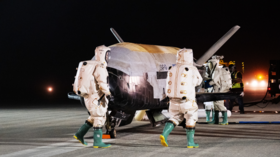US Space Force announces major anti-China move

The United States Space Force is set to create its first-ever component command in the Indo-Pacific region, where officials have increasingly pointed to rising tensions with regional rivals such as North Korea and China.
The US Indo-Pacific Command (INDOPACOM) announced the move on Monday, noting it would oversee the new Space Force unit after it launches later this week. INDOPACOM is the combatant command responsible for much of East Asia and the Indian subcontinent, and will be the first to host a Space Force component after the branch was created in late 2019.
Once established, the Space Force unit will reportedly help to improve US capabilities to detect and intercept ballistic and cruise missiles fired from countries in the region, though the military offered few details about its exact function.
The branch’s newly appointed chief of space operations, Lt. Gen. B. Chance Saltzman, previously suggested the unit will be largely focused on Beijing.
“We just think space is so critical now that we need a seat at that table,” Saltzman said during an event last May, adding: “With China being the pacing threat, it was essential that we stand up the service component at INDOPACOM.”
The announcement comes amid rising tensions between Washington and multiple regional rivals, namely China and North Korea, seeing the US military bulk up its presence in the Indo-Pacific. A series of recent joint drills with South Korea and Japan have triggered a flurry of retaliatory missile tests by Pyongyang – including two ICBM launches this month alone. US lawmakers have also continued periodic visits to Taiwan, enraging Beijing, which sees the island as part of its sovereign territory, while American warships have transited the Taiwan Strait on a near-monthly basis.
Though INDOPACOM will be the first combatant command to receive its own Space Force component, Vice Chief of Space Operations Gen. David Thompson has said that as the military works to “effectively integrate space capabilities” others would follow “very quickly thereafter,” including units under the US Central Command – and US European Command, which is already deeply involved in unprecedented intelligence-sharing with Ukraine amid its conflict with Russia.













